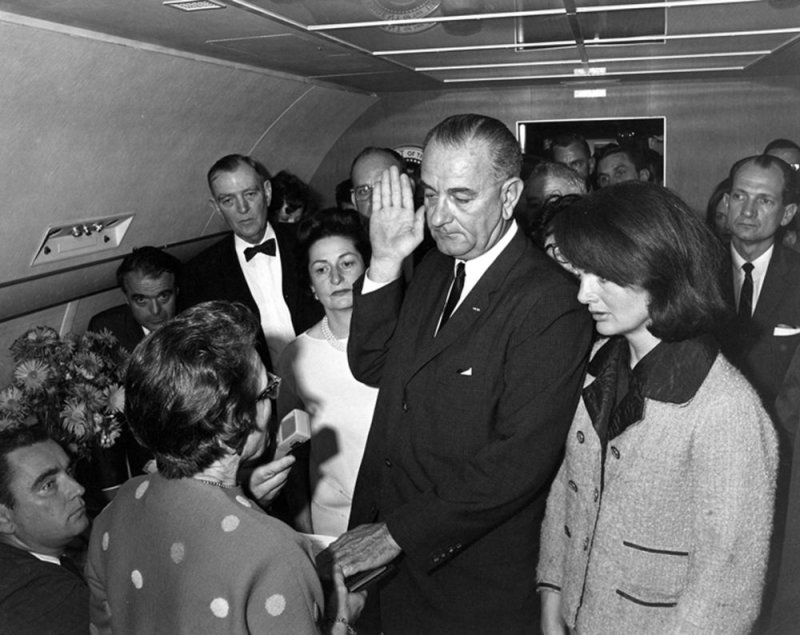Judge Sarah T. Hughes administers the Presidential Oath of Office to Lyndon Baines Johnson aboard Air Force One, after President John F. Kennedy was assassinated, at Love Field in Dallas Texas on November 22, 1963. Mrs. Johnson, Mrs. Kennedy, Jack Valenti, Rep. Albert Thomas, Rep. Jack Brooks, Associate Press Secretary Malcolm Kilduff (holding microphone) and others witnesses attend. November 22, 2012 marked the 49th anniversary of the day President Kennedy was assassinated in Dallas, Texas. (UPI Photo/Cecil Stoughton/John F. Kennedy Presidential Library & Museum) |
License Photo
BEAUMONT, Texas, Dec. 5 (UPI) -- Jack Brooks, who represented southeastern Texas for 42 years in the U.S. House and was in the motorcade when President John F. Kennedy was shot, died at age 89.
The Jefferson County Sheriff's Department said Brooks died Tuesday at Beaumont Baptist Hospital after a sudden illness, The Beaumont Enterprise reported Wednesday.
Vice President Joe Biden said he was "deeply saddened" to learn of Brooks 'death.
"He was a Texan through and through -- tough, bold and bigger than life," Biden said. "He lived by principles that were carved into his heart, and he was never afraid to fight for what he believed in.
"In the '60s, he was one of the few southerners to boldly support civil rights. And throughout his career, Jack was always determined to do right by the people who sent him to Congress, whether that meant investigating Iran Contra, or fighting to root out government waste.
"He was a great man, and one of the privileges of my Senate career was working side-by-side with Jack when I was chairman of the Senate Judiciary Committee and he was chairman of the House Judiciary Committee. Our thoughts and prayers are with Jack's family today."
Brooks, who would have celebrated his 90th birthday Dec. 18, was surrounded by family when he died, Deputy Sheriff Rod Carroll said.
He was a contemporary and supporter of Lyndon Johnson, who was U.S. Senate majority leader in the 1950s before becoming Kennedy's running mate and succeeding him after the assassination.
Brooks was in the Dallas motorcade Nov. 22, 1963, when Kennedy was shot and was pictured immediately behind Jacqueline Kennedy in a dramatic photograph of Johnson taking the oath of office aboard Air Force One.
Brooks was first elected to the House in his far Southeast Texas district in 1952 and returned to office 20 more times before he was ousted in the Republican revolution of 1994.
He gained fame for his attacks on government waste and known for glaring at witnesses over his eyeglasses as he chomped on a cigar when he led the House Government Operations Committee.
"I never thought being a congressman was supposed to be an easy job, and it doesn't bother me a bit to be in a good fight," Brooks said once in an interview.
Brooks also served on the House Judiciary Committee, where he strongly supported President Richard Nixon's impeachment.
Among Brooks' legislative accomplishments were laws that required full and open competition for awarding federal contracts, established independent Offices of Inspector General in major agencies, provided a uniform system of federal procurement and established the Department of Education.
A supporter of civil rights, Brooks refused to sign the segregationist "Southern manifesto" in 1956 and helped write the Civil Rights Act of 1964.
Brooks, born Dec. 18, 1922, in Crowley, La., moved to Texas at age 5. He was a U.S. Marine, serving in the Pacific in World War II, and retired as a colonel from the Marine Corps Reserves in 1972. He was a state legislator when he was elected to the U.S. House.
Brooks is survived by his wife, three children and two grandchildren.















